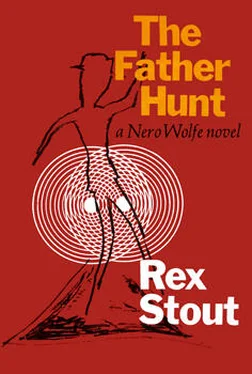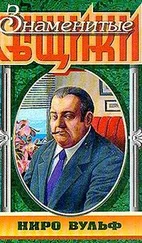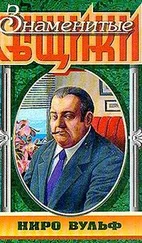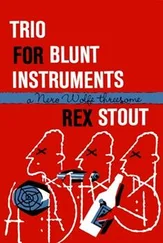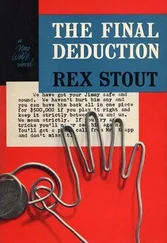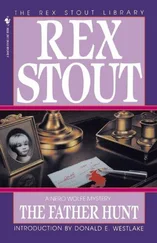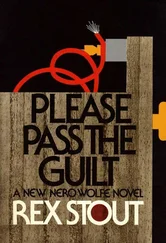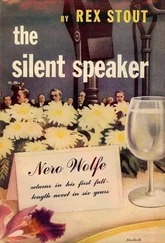I expected him to start the lip act, but he merely cocked his head. “The point,” he said, “is that we don’t know which of two alternative situations faces us. If he is the father but not a murderer, establishing it will be difficult if not impossible. He did that many years ago. But if he is also a murderer the situation is much simpler; he did that only three months ago. We’ll resolve that and then decide how to proceed. Can you get him here this evening?”
“For what? Do I ask him if he still wants to meet you?”
“That would do to start. If he says no, tell him I want to meet him. Tell him I want to ask him why he didn’t reply to the advertisement requesting information about Carlotta Vaughn, alias Elinor Denovo.”
I had noted the listing of Vance’s home phone, but got the directory to check on the number, and found that my memory had it right. It was a quarter to seven when I dialed, and if he ate out I would probably get no answer. But after two rings I got a hello.
“Mr. Floyd Vance, please?”
“I’m Floyd Vance.”
“I’m Archie Goodwin. I work for Nero Wolfe. You may remember that we met at Lily Rowan’s place, and you—”
“I remember.”
“And you said you would like to meet Nero Wolfe to make a proposal. I reminded Mr. Wolfe of that just now when we were discussing something, and he decided he would also like to meet you. Could you come this evening, say at nine o’clock?”
Silence. Five seconds. “This is short notice.”
“I know. It’s not as urgent as a five-alarm fire, but if it’s not too inconvenient... the address is—”
“I know the address.” Silence. “You say nine o’clock?”
“Right. Or later if that would suit you better.”
“Don’t be so goddam polite. I’ll be there around nine.”
As I hung up, the doorbell rang, and I went, expecting Saul, and it was. I opened the door only a couple of inches and said through the crack, “You may not want to come in. No champagne. There are angles.”
It was my fault. When Saul had phoned I had just got home, so pleased with myself and wanting to spread joy around that I had not only invited him to dinner but also told him I would have a bottle of Dom Pérignon ready to open. Then the angles had made it obvious that putting champagne in the refrigerator would be premature and I hadn’t gone to the kitchen. Not that Saul needed any explanations or apologies; that long dry spell had got on his nerves too.
Anyway, along with the clams and broiled turtle steaks he drank more than half of a bottle of Montrachet, so all he missed was bubbles.
With coffee, in the office after dinner, we settled the program. When Vance arrived Saul would go to the front room, and as soon as the guest was in the office and seated he would leave, to go to 490 Lexington Avenue and collect likely objects for fingerprints. Since he had seen the lock he knew which keys to take from the assortment in the cabinet, and after he made his selections he helped me prepare the props in the office. We did a thorough wiping job on twelve objects: the stand by the red leather chair, two ash trays — one on the stand and one on the corner of Wolfe’s desk — two photographs of Elinor Denovo in a drawer of Wolfe’s desk, four glasses of different kinds, since we didn’t know what he would drink, two books of matches — one on the stand and one on Wolfe’s desk — and every inch of the red leather chair. Now and then I took a second for a glance at Wolfe, for comic relief. He sat with his fingers laced at the summit of his center mound, scowling at us. He knew darned well that what we were doing was a lot more important than anything he could possibly be thinking, and it hurt. He would have loved to take the position, and hold it, that he could solve any problem on earth or in outer space by leaning back and closing his eyes and working his lips. The trouble was that the little chores Saul and I did for him were nearly always done somewhere else, but that time it was going on right there in his office, before his eyes. I was surprised that he didn’t get up and go to the kitchen.
Amy’s father rang the doorbell at ten after nine. As I went to admit him Saul headed for the connecting door to the front room, and as I took him to the office and to the red leather chair I did something that I had done many times although I had learned long ago that it was absolutely useless. For a spectator in a courtroom to try to decide from a man’s looks if he’s guilty or not is natural and he has to pass the time somehow, but for a working detective it’s pure crap. So I did it again. I looked at Vance’s puffed eyes, flabby cheeks, thin hair, saggy shoulders, down to his brown shoes that needed a shine actually hoping to get a slant on the question, Did he kill Elinor Denovo? Nuts.
By the time I got to nuts Wolfe was saying, “... not that I scorn all trite expressions; some of the finest words and phrases in the language were once vulgarisms and are well worn. But a faddish cliché like ‘image’ as now abused is an abomination. You told Mr. Goodwin that my ‘public image’ needs expert handling and you would like to meet me. If you have some proposal to make I’ll listen as a matter of courtesy, but don’t call my repute my image.”
“To hell with your courtesy. Shove it.” Vance’s voice was not as I remembered it. I had thought he was a fairly smooth talker that Sunday, but now the words came out blurry. He went on, “I’ve learned something about you since I talked with Goodwin. You don’t give a damn about your public image. Did you get me here just to tell me you don’t like clichés? Do I go home now?”
Wolfe nodded. “That’s your question, why I got you here. My question is, Why did you come? I doubt if either of us expects a candid answer. In fact, Mr. Vance, I’m in some confusion about my objective. One possibility is that I would like to know why you prevailed on your friends to drive you to Miss Rowan’s so you could meet Mr. Goodwin. Another possibility is that I would like to know why you made several attempts to see Mrs. Elinor Denovo last May. Still another is that I want to ask you about your association with Miss Carlotta Vaughn in the summer of nineteen forty-four. And again, another is that I wondered why you didn’t reply to an advertisement which appeared—”
“Jesus. Give me a pad and pencil. I’ll have to make notes.”
We hadn’t wiped a pad. You can’t think of everything. I got one from a draw, and a pencil, and went with them, and he took them, probably because he was uncertain what to do with his tongue and so was glad to have something to do with his hands.
“As you see,” Wolfe said, “I have — since you fancy clichés — an embarrassment of riches.” His head tilted; I hadn’t sat. “Beer, please, Archie?”
“Yes, sir.” I took a step and stopped. “Something wet, Mr. Vance?”
He shook his head and said emphatically, “No.” I started out, foiled because a glass or a bottle is a best bet, and as I neared the door his voice stopped me. “What the hell. Scotch and water. And ice.”
Fritz, having been told that he wouldn’t be needed, had gone out. In the kitchen I put Wolfe’s beer and glass on a tray, and on another tray a wiped glass, a bowl which I wiped before putting icecubes in it, a pitcher which I wiped before putting water in it, and a bottle of Johnnie Walker Black which I also wiped. That took a while and made me miss something. When I got to the office with the trays Vance had used his hands some more and had a cigar lit, so I didn’t know if he carried them loose or in a case, or if he had used the matches on the stand. The cigar was a long panatela, nothing like a Gold Label Bonita, but that didn’t bother me; if he had left that case in the hit-and-run car it would have been common prudence to switch. After serving the trays I went back to the kitchen for a glass of milk and when I returned to the office Vance had his glass in hand and Wolfe was talking.
Читать дальше
